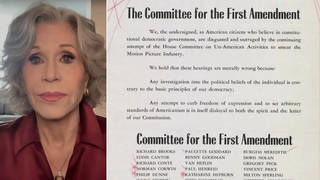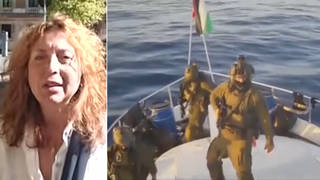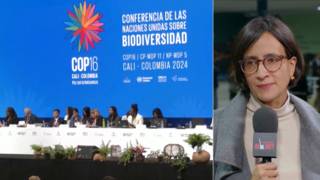
Guests
- Boluwaji Onabolupresident of the Network of Nigerian Female Professionals in WASH in Nigeria and the diaspora.
- Mohammed Mahmouddirector of the Climate and Water Program at the Middle East Institute.
A new report by the United Nations warns that a quarter of humanity lacks access to safe drinking water, and nearly half of the global population has no access to basic sanitation. Unless action is taken, 60% of the world’s population could face water supply issues by 2050. At the U.N. Water Conference in New York last week, U.N. Secretary-General António Guterres addressed the report’s findings and warned of the potential link between water scarcity and war. From Abuja, Nigeria, we speak to Boluwaji Onabolu, president of the Network of Female Professionals in WASH in Nigeria, which focuses on water, sanitation, hygiene and public health. We’re also joined from Phoenix, Arizona, by Mohammed Mahmoud, the director of the Climate and Water Program at the Middle East Institute.
Transcript
AMY GOODMAN: We turn now to a somewhat overlooked but hugely significant new report by the United Nations that warns a quarter of humanity lacks access to safe drinking water, nearly half of the global population has no access to basic sanitation. Unless action is taken, 60% of the world’s population could face water supply issues by 2050. U.N. Secretary-General António Guterres addressed the findings at the U.N. Water Conference here in New York last week, the first such event in nearly half a century.
SECRETARY-GENERAL ANTÓNIO GUTERRES: Water is a human right — and the common development denominator to shape a better future. But water is in deep trouble. We are draining humanity’s lifeblood through vampiric overconsumption and unsustainable use and evaporating it through global heating.
AMY GOODMAN: The secretary-general follows other U.N. secretaries-general who warned of the link between water and the potential for war, including Boutros Boutros-Ghali in 1985, who said, quote, “The next war in the Middle East will be fought over water, not politics,” and Ban Ki-moon, who warned in 2007, quote, “Water scarcity threatens economic and social gains and is a potent fuel for wars and conflict.”
For more, we’re joined by two guests who work in areas facing some of the worst water scarcity. In Phoenix, Arizona, Mohammed Mahmoud is with us, director of the Climate and Water Program at the Middle East Institute. And in a capital of Nigeria, in Abuja, Boluwaji Onabolu is with us, president of the Network of Nigerian Female Professionals in Nigeria and the Diaspora, which focuses on water, sanitation, hygiene and public health.
We welcome you both to Democracy Now! Let’s begin with Boluwaji. If you can talk about what’s happening across the continent of Africa? The numbers are absolutely terrifying of who has access to water, to clean drinking water, not to mention sanitation.
BOLUWAJI ONABOLU: Thank you very much, Amy, for having me on.
Before I speak about Africa, the world water report that you referred to has actually brought to the attention of the world something that is a bit different from what we in the sector have been looking at. Usually, reports would say this number, this proportion of people globally, will not have access to basic water and sanitation, for example. But in this report, this report says that if urgent action is not taken, the number of people that will not have access to basic drinking water will double from 2016, which was about 930 million people, to 2.4 billion people. Currently, as you mentioned, we are already at 2 billion people.
Now, a linked report, the World Water Assessment Report, did an assessment in Nigeria — sorry, in Africa for the very first time, and I would like to just quote some of the figures or the findings. In Africa, not a single country, not to talk of any sub-region, scored above 90 out of the 100 possible points. The five top countries had just about an average of 60 to 70. In the past five years, 25 out of 54 countries in Africa made no progress at all. Access to basic drinking water ranged from 37% in the Central African region to about 99% in Egypt. Coming to my country, Nigeria, which is very pivotal, because Nigeria, with its population of about 200 million people, has more people than the whole of West Africa combined, and in terms of regression, access to basic water reduced from 67% in — from 70% in 2018 to 67% in 2021.
What are the implications? The world water report reminds us, and like you said, the current U.N. secretary-general and the past ones have said that access to water, water security, is pivotal to achieving every other human right, every sustainable goal. So, for us in Africa, it’s a major, major issue — the impact on health, impact on education, impact on the economy, impact on security. So, this world water report calls for synergizing, speeding up, scaling up and sustaining. I’ll leave it at that for now.
AMY GOODMAN: Mohammed Mahmoud, you are director of Climate and Water Program at the Middle East Institute. We’re speaking to you in Phoenix. Can you talk about what particularly is happening in the Middle East right now around water? We always hear about oil and gas and wars for oil. What about wars for water?
MOHAMMED MAHMOUD: Well, good morning, Amy, and thanks again for having me on the show.
I think, just to link with the report and what was just mentioned, one of the main takeaways is that we’re certainly not on track for the sixth Sustainable Development Goal as it relates to clean, safe water and sanitation, to meet the mark that was intended by 2030. And I think that’s just one piece of the puzzle when we look at those issues related to water quality.
Similarly, in the Middle East, North Africa and certainly other parts of the world share this issue. When it comes to water security, I think there’s multiple dimensions that are being impacted. One, on the water supply side. And that is overlaid with the impacts of climate change. Certainly, climate change amplification has caused droughts, certainly in the region, to become more sustained and severe. The region itself is already naturally prone to being dry and arid, but with the overlay of climate change, freshwater sources have been stressed. I mean, to put it into perspective, 12 of the 15 most water-stressed countries in the world reside in the Middle East and North Africa region.
So, what does that look like? Groundwater supplies have been the predominant source of supply for the region for as long as folks have been utilizing water. Those have been overdepleted. The few surface water systems and rivers, certainly the two biggest — the Nile River Basin and Tigris-Euphrates system — because of the impacts of climate change, these high — these systems that rely on high elevation water being generated from snowpack or precipitation are experiencing less generation of water from these higher elevations. That causes an issue, certainly when we think about transboundary nations, certainly in the Nile, Ethiopia being upstream in the Blue Nile, Egypt, Sudan downstream, causing tensions because of the reduction of the water supply, similarly in the Tigris-Euphrates between Turkey downstream to Syria and Iraq. That’s just the water supply angle.
When we look at water demand, with less water available, there’s a lot more competition from the different sectors of water use. The biggest, actually, is agriculture, which was mentioned in the report itself. About 60 to 70% of water use globally, on average, and certainly from country to country, goes towards agricultural water use to support food production and food security. An order of magnitude less than that is water needed for human consumption, so residential or urban water demand. And then the other category is industrial water use to support manufacturing, energy production. Power plants need water for cooling and so forth. So, with less water, the sectors are, in essence, becoming in competition with each other.
The other piece that’s also of concern is water conveyance issues. What I mean by that is how do we move water from the source to where it’s being used, whether through open channel canals, conveyance pipelines. Certain parts of the Middle East have water conveyance infrastructure that is so old or has been neglected in terms of repair and maintenance. Certainly, when we look at places like Lebanon and Jordan, some parts of their water infrastructure is losing up to 40 to 50% of the water being transmitted from source at least to residential demand. That’s a lot of water wasted that could be saved to help mitigate some of these issues of not enough water and too much demand.
Then, of course, the last piece, which we just really talked about, is water quality. When we think of where water tends to be transmitted or conveyed the most, these tend to be towards urban centers, where more populations reside in the region. The drawback of that is those communities that live in rural areas outside of these more dense networks where water is being conveyed from source to utilization, those areas tend to be neglected. And in some cases, the concern — and we’ve seen this in Syria certainly over the last few years because of conflict and other issues happening there — that these rural communities that are outside these urban centers, because of economic conditions, rising costs, not being within the networks of water transmission, tend to take water directly from the surface water systems, like the Tigris-Euphrates, directly. And, of course, without proper treatment and adequate water treatment, many of these people can fall ill and could cause an outbreak of waterborne illnesses.
So, certainly, the report highlights, I think, the water quality component in terms of sanitation, clean water, does mention the issue of agricultural water use being so high. But I think there’s also these other issues that compound the water security question, certainly in the Middle East, but you can certainly draw parallels to other parts of the world, as well.
AMY GOODMAN: And as we begin to wrap up, Boluwaji Onabolu, you have talked about water rights as human rights, and you say that people should be held — who are in power, should be held accountable for war crimes. Explain.
BOLUWAJI ONABOLU: OK. Well, I used the word “water crimes.” I said if there is a term called “war crimes,” why don’t we have “water crimes”? Because we normally say, “Water is life.” However, for 353 million people in Africa, those 353 million people that lack access to opportunities that health, income generation, education opens for them because the political leadership has failed to provide opportunities for them to access this basic resource, I believe that the sector and the world really should be talking about water crimes in terms of political accountability, because without accountability, we will not be able to ensure that the resources are going to where they are supposed to go to and to whom they are supposed to reach.
AMY GOODMAN: Well, Boluwaji Onabolu, we want to thank you for being with us, president of an NGO in Nigeria focused on water sanitation, hygiene and public health, Nigeria the most populous nation in Africa, and Mohammed Mahmoud, director of Climate and Water Program at the Middle East Institute, speaking to us from Arizona.












Media Options